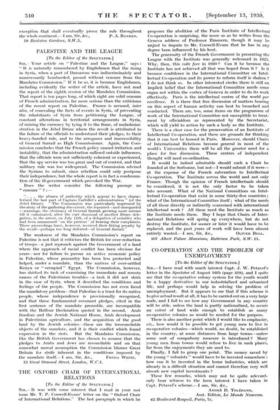PALESTINE AND THE LEAGUE
[To the Editor of the SrEcLaroa.] Sta,—Your article on " Palestine and the League," says : " It is naturally remembered by Englishmen that the rising in Syria, when a part of Damascus was indiscriminately and unnecessarily bombarded, passed without censure from the Mandates Commission." If it be so, it is because Englishmen, including evidently the writer of the article, have not read the report of the eighth session of the Mandates Commission. That report is ten pages long, of which eight are solid censure of French administration, far more serious than the criticisms of the recent report on Palestine. France is accused, inter alio, of concealing the facts of events in Syria, of preventing the inhabitants of Syria from petitioning the League, of constant alterations in territorial arrangements in Syria, of ruining the currency by tying it to the franc, of maladmini- stration in the Jebel Druze where the revolt is attributed to the failure of the officials to understand their pledges, to their heavy-handed rule, and to the arrogance and inaccessibility of General Sarrail as High Commissioner. Again, the Com- mission concludes that the French policy caused irritation and instability, that the administration suffered outside influences, that the officials were not sufficiently coherent or experienced, that the spy service was too great and out of control, and that military rule was too widespread. The Commission advised the Syrians to submit, since rebellion could only postpone their independence, but the whole report is in fact a condemna- tion of the ill-government which provoked the War.
Does the writer consider the following passage no " censure " ?
" . . . the abuses of authority which appear to have charac- terized the last part of Captain Carbillet's administration " (of the Jebel Druze). " The Commission was particularly impressed by the story of the gathering discontent, the repeated—and disregarded —warnings, the obstinacy of General Sarrail, growing more intense till it culminated, after the curt dismissal of another Druze dele- gation, in the arrest, on July 11th, of a delegation of notables who had been summoned ' on the pretext' of hearing their complaints. These proceedings have, however, received their fitting penalty by the recall—perhaps too long deferred—of General Sarrail."
The weakness of the Mandates Commission's report on Palestine is not that it criticises the British for over-reduction of troops—a just reproach against the Government of a land where the approach of racial conflict has been obvious for years—nor for failure to pursue an active economic policy in Palestine, whose peasantry has been less protected and helped, under a mandate, than the natives of over-settled Kenya or " occupied " Egypt. The Commission, however, has shirked its task of examining the immediate and remote causes of the Palestinian troubles—a task it did not shirk in the case of Syria, where it described the conditions and feelings of the people. The Commission has not even faced the mandatory problem—that Palestine is a trust for its native people, whose independence is provisionally recognized, and that these fundamental covenant pledges, cited in the first sentence of the mandate preamble, are incompatible with the Balfour Declaration quoted in the second. Arab freedom and the Jewish National Home, Arab development in Palestinian agriculture, and the acquisition of the good land by the Jewish colonies—these are the irreconcilable objects of the mandate, and it is their conflict which found expression in the riots. But the Mandates Commission, like the British Government has chosen to assume that the pledges to Arabs and Jews are reconcilable and on that somewhat unreal assumption the Commission blames Great Britain for strife inherent in the conditions imposed by the mandate itself.—I am, Sir, &c., FREDA WHITE. 12 Great Ormond Street, London, W.C.1.










































 Previous page
Previous page